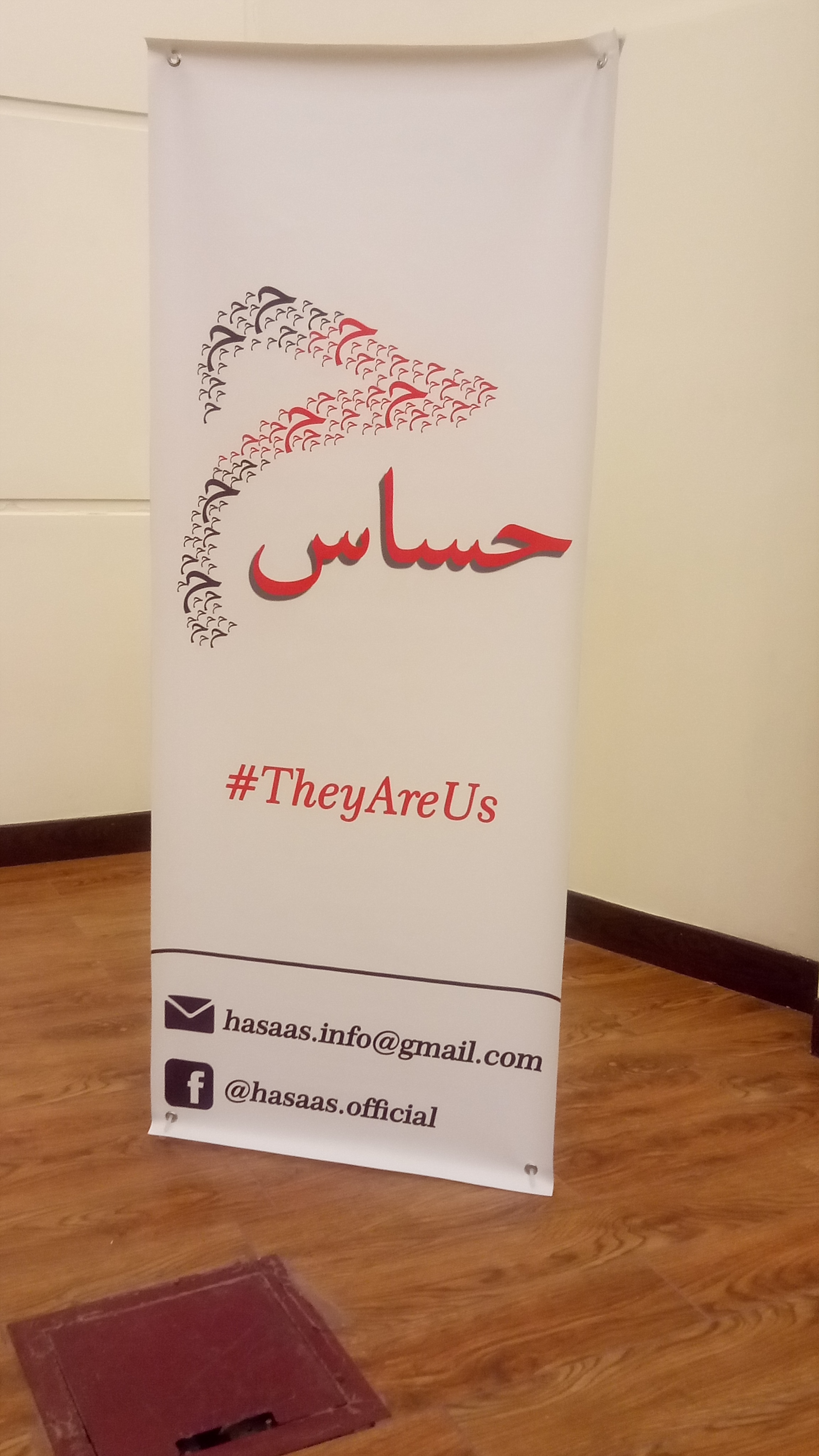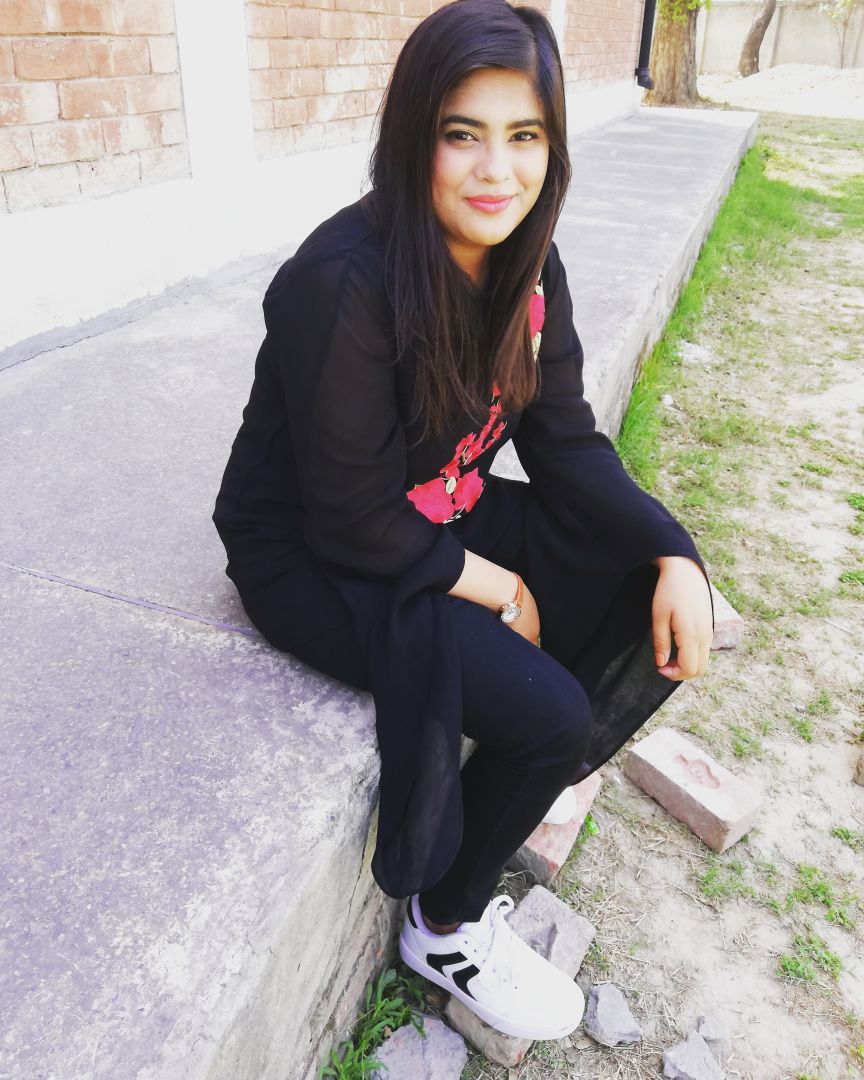
The banner for the event has the name Hasaas in the Urdu language. (Amber Shakil/YJI)
Lahore, PAKISTAN – Today we see people fighting for equal rights for both men and women. But some people here want society to recognize the rights of transgender people, too.
Three transgender people spoke at Beaconhouse National University in Lahore this week as part of The Acceptance Program, a collaboration of two human rights organizations, Hath Barhao and Hasaas.
The program aims to integrate the transgender community into Pakistani society by spreading awareness and then taking practical steps to create an equal society for all.
The speakers represented the Khawaja Sira Society – the name means “transgender.” Each explained their individual gender and said they just want to be accepted as normal human beings. If they had not been rejected by society, they said, they would have been able to achieve much more in life.
This interactive session, which drew a crowd of about 100 students and included time for questions, started with the panelists explaining the term “transgender.”
The word “transgender” or “trans” refers to people whose gender identity – their deeply-felt psychological sense of being a woman or man or neither – is different than the sex assigned to them at birth.
Someone who was born female and now identifies as a man is a “transgender man” or “trans man.” A person who was born male and now identifies as a woman is a “transgender woman,” or “trans woman.”
In Pakistani society, as in many places in the world, transgender people are not accepted. They are considered misfits. While there are some laws in place to protect transgender people, they are sometimes still targeted with violence. A general misconceptions about this community in Pakistan are that transgender people can do nothing except begging, dancing or sex work. Some believe that a guru misleads them or that transgender people are able to put a curse on someone.
Aman Afzal, an 18-year-old business student in the Institute of Business Administration at the University of the Punjab, said she sees the community not accepting transgender people or giving them equal rights.
When she hears the word “transgender,” she said, “The first thing that comes into my mind is inequality.”
Afzal did not attend the panel discussion. She said that probably won’t help change minds. What’s needed, she said, is equal rights and opportunities for transgender people.
“Media can help bring a change,” Afzal said. “And most importantly, in my view, we should tell our kids that there exists a third gender and that’s equally respectable. We shouldn’t make an unclear and disgusting image of transgenders in our kids.”
Afzal said she does not consider transgender people to be abnormal but said society views them as unacceptable. There isn’t much interaction between transgender people and the general population, she said, so people don’t think about them.

Aman Afzal, a business student in Lahore, Pakistan, said transgender people deserve rights and opportunities. (Amber Shakil/YJI)
“We tend to deny that there’s even a third gender and so is their existence is denied,” Afzal said.
In Pakistan, some transgender people can be seen begging at traffic signals – something Afzal said should not be happening.
“We should actually give them equal opportunities to come forward, learn and become responsible citizens and follow their dreams,” said Afzal.
Forman Christian College student Usama Amjad is a founder of Hasaas, a non-government human rights organization that hosted the event. Hasaas, which means “sensitive,” is a group of youth trying to fight social inequality in Pakistan. They’ve worked with children in orphanages and people in old age homes.
Amjad said Hasaas decided to hold the event after having successful with smaller interactive sessions – groups of 15 to 20 people – and khawaja siras, or transgender people.
“Most of the people have horrible misconceptions about transgenders,” Amjad said. “We wanted to hold this seminar in front of a large audience to first, remove the misconceptions and inform them about the basic information every person should have about khawaja siras. And secondly, to reduce the communication gap with the trans community so that we can move a step forward towards accepting each other.”
One of the speakers, Moon Ali, has a master’s degree in business administration. She is well known in the transgender community and since 2012 has served as program manager and director of the Khawaja Sira Society. She advocates on HIV/AIDS and other health-related issues of the transgender community.
Ali also worked with many organizations in the accounts and finance field, including the Lahore Chamber of Commerce and she has experience in teaching both the general population and transgenders.
Speaker Zehrish Khan from Karachi has an undergraduate degree in commerce from Karachi University.
Khan, whose activism against stigma and discrimination began when she was a student, has represented Pakistan’s transgender community internationally and in media campaigns. She would like to go into politics to be part of making the decisions that impact her community.
Saima Butt, who was also a panelist, is from Lahore. Her family situation didn’t allow her to get an education, but she’s been active in the Khawaja Sira, or trans community, since 2005. For the last seven years, she’s been working with elderly trans people and in 2012 began doing outreach for the Khawaja Sira Society. Her goal is to help transgender people be part of the mainstream in Pakistan.
During the question and answer portion, speakers said that Pakistan is taking some steps to protect the transgender community but that there is more to be done.
Transgender people surely raise their voices when members of their own community are cast out by their families, but Ali said it is everyone in society’s job to take care of them. It is the responsibility of everyone, she said, and especially the state.
The panelists said Pakistan should start with its educational sector. For instance, the country should have a third column in the gender section on admission forms, they said. And once a transgender person succeeds in getting into a university or professional institute, they should be supported, rather than harasses and teased, they said.
For this project, Hasaas partnered with the organization Hath Barhao, which works on behalf of the transgender community in Pakistan. “Hath” is an Urdu word which means hand and “barhao” is also an Urdu word which means to initiate or start. Together, it is like saying move one step towards us and we will help by taking two more steps towards you.
Amber Shakil is a Senior Reporter with Youth Journalism International. Read her reporter’s notebook about attending this event.




I really like your post. Thanks for sharing this blog. Keep up the good work admin.